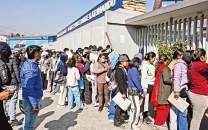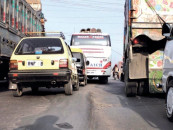2B people lack safe drinking water worldwide, says WHO, UNICEF
Every year, 1.4M people die from preventable causes linked to unsafe water, poor sanitation

Around the world, 2 billion people lack safe drinking water, the World Health Organization and UNICEF said in a joint statement on Wednesday.
The statement, which calls on all nations to "radically accelerate action" to make water, sanitation, and hygiene (WASH) a reality for all, came ahead of the UN Water Conference in New York.
"The numbers are staggering – around the world, 2 billion people lack safe drinking water and 3.6 billion people – almost half the world's population – use sanitation services that leave human waste untreated," the organizations said.
Millions of children and families do not have adequate WASH services, the UN bodies said, as they warned that "the consequences can often be deadly."
Also read: Over 10m lack access to safe water in flood-hit areas
"Each year at least 1.4 million people – many of them children – die from preventable causes linked to unsafe water and poor sanitation," they continued. "Right now, for example, cholera is spreading in countries that have not had outbreaks in decades."
Half of all healthcare facilities lack water and soap or alcohol-based hand sanitizing solution, the statement noted. The social and economic consequences of inadequate water and sanitation services are also devastating, it added.
"These services are key to healthy development in children and for sustaining well-being as adults," the WHO and UNICEF said.
Everyone, they said, has the right to safe water, proper sanitation, and hygiene.
"Collectively, the world needs to at least quadruple the current rates of progress in order to achieve universal access to safely managed WASH services by 2030.
"Progress needs to be even faster in fragile contexts and the poorest countries to protect people's health and futures," they urged.



















COMMENTS
Comments are moderated and generally will be posted if they are on-topic and not abusive.
For more information, please see our Comments FAQ